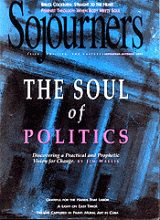In September the ordered world of Proverbs and James is read against the cross of Marks world. Walter Brueggemann reminds us of Karl Marxs dictum, "The ruling ideas of each age have ever been the ideas of its ruling class."
Who benefited by our pious simplistic characterizations of the Hebrew scriptures as law and the New Testament as grace? How did reading Proverbs and not the Prophets prepare us so easily to turn the symbol of the authorities answer to those who defied them into a symbol of the devotional life that posed no threat to the authorities? Septembers meditations will bring a chill to "whatever is, is right."
Likewise, Octobers Bible passages may enlarge and disturb our image of God. We meet a God who asks us questions. We meet a God who balances the scales in the marital relationship and puts children at the center of what God is about, and a woman who models what it means to be faithful in a relationship.
New world a-coming.
Disturbing world a-coming.
September 4
Who Are God's People?
Proverbs 22:1-2, 8-9, 22-23; Psalm 125; James 2:1-10, (11-13), 14-17; Mark 7:24-37
Earlier translations render the first verse of todays scripture as "The rich and poor meet together," but the New Revised Standard Version specifies the basis of the meeting: "The rich and poor have this in common: The Lord is the maker of them all."
These proverbs assigned to a royal author do not question the fact that there are rich and poor people in the world. He is only concerned with how they are to be treated. He who has a "bountiful eye" will be blessed.
The responsive psalm assures us the Lord protects the people. The nagging question stays with us: Who are the Lords people?
Read the Full Article
